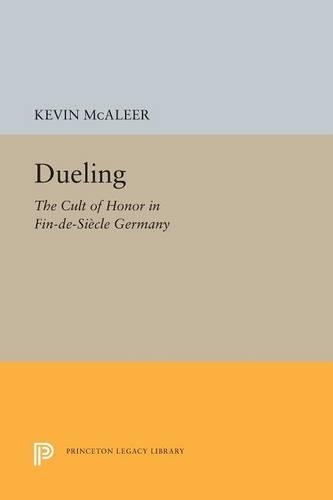
Dueling: The Cult of Honor in Fin-de-Sicle Germany
(Paperback)
Available Formats
Publishing Details
Dueling: The Cult of Honor in Fin-de-Sicle Germany
By (Author) Kevin McAleer
Princeton University Press
Princeton University Press
23rd September 2014
United States
Classifications
Tertiary Education
Non Fiction
394.80943
Physical Properties
Paperback
284
Width 152mm, Height 229mm
397g
Description
The question of what it takes "to be a man" comes under scrutiny in this sharp, often playful, cultural critique of the German duel--the deadliest type of one-on-one combat in fin-de-siecle Europe. At a time when dueling was generally restricted to swords or had been abolished altogether in other nations, the custom of fighting to the death with pi
Reviews
"[The book] contains excellent material on the mechanics of the duel, and penetrating passages on every subject it deals with. McAleer is often clever and always spirited."--David Blackbourn, London Review of Books "[A] well-researched and entertainingly written study."--Richard J. Evans, The Times Literary Supplement "[An] engaging and valuable monograph... [McAleer] has presented his account with verve, wit, and a rich and colorful vocabulary... This book deserves an established place in the bibliography on modern German society."--Vernon L. Ludtke, American Historical Review "A positively captivating look at turn-of-the-century Germany... "--D. R. Dorondo, The Historian "[McAleer] argues that dueling in Wilhelmine Germany, although only practiced by an aristocratic minority, helped shape German attitudes toward honor, women, and other countries... a fascinating glimpse into a deadly icon of the German popular imagination."--Library Journal "Between 1871, when the Franco-Prussian war ended, and 1914, when the first world war began ... German officers kept boredom at bay by killing each other in pistol duels... Kevin McAleer's book is extraordinarily comprehensive, taking the astonished reader through the dueling ritual from first provocation to final death agony."--The Economist "Kevin McAleer has dispelled any romanticism surrounding the nineteenth-century German duel... [He] wholeheartedly enters into the fascinating intricacies of dueling... [and] keeps his moral indignation at bay, with a tone of ironic humor throughout."--Alexander Rose, Literary Review "[This] portrait of Germany's dueling classes is vivid and appalling. It fully illustrates the book's wonderful epigraph, taken from W. Somerset Maugham: "Man has always found it easier to sacrifice his life than to learn the multiplication table."--Lee Lescaze, Wall Street Journal "Kevin Mcaleer has spent five years researching the fin-de-siecle German duel... The results ... are contained in this intriguing book. One is left staggered at the triviality of the causes for which men were willing to risk death... and at the pretentiousness of the pseudo-chivalrous etiquette of the German duel."--Sunday Telegraph (London) "... [a] lively, opinionated account of dueling in Germany. McAleer is thorough about the weapons, the customs, even the proper dress for dueling, and he's properly sardonic about the adolescent code of honor that perpetuated it."--Men's Journal "... the book has many virtues. It contains excellent material on the mechanics of the duel, and penetrating passages on every subject it deals with. McAleer is often clever and always spirited."--London Review of Books "[An] unusually lively, informative, and provocative description and interpretation of the duel in recent Germany's cultural, social, and legal history... McAleer concludes persuasively that Germany's dueling tradition ... leads inexorably to Nazism, a finding that ensures controversy. Based on archival and rare published materials and belles lettres, with illustrations and bibliography, this is a refreshingly unconventional, suggestive, and strongly recommended study."--Choice "A positively captivating look at turn-of-the-century Germany... The phenomenon of the affair of honor must, as it now appears in light of McAleer's efforts, be considered if one is to understand more completely the critical role of Germany's post-1890 internal evolution or that country's place in modern Europe."--D. R. Dorondo, The Historian
